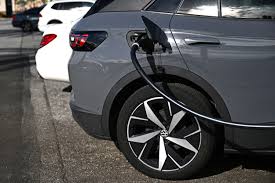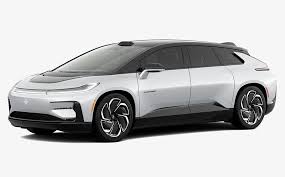$30 Million Reward for Electric Vehicle Innovators

$30 Million Reward for Electric Vehicle Innovators
Introduction: In an exciting development for the electric vehicle (EV) industry, a $30 million reward has been announced to encourage innovation and advancements in electric vehicle technology. This challenge, aimed at innovators, engineers, and entrepreneurs around the world, is designed to accelerate the development of sustainable, efficient, and affordable electric vehicles. As the world moves toward a cleaner, greener future, the role of electric vehicles is more critical than ever. This reward represents a significant investment in finding breakthrough solutions to the challenges faced by the EV industry, from battery efficiency to charging infrastructure. In this article, we explore the details of the $30 million reward, its potential impact on the electric vehicle market, and what it means for the future of sustainable transportation.
The Challenge: Fostering Innovation in Electric Vehicles The $30 million reward is intended to stimulate creativity and innovation in the electric vehicle sector, with a particular focus on solving some of the key challenges that have hindered the widespread adoption of EVs. These challenges include limited driving range, long charging times, high manufacturing costs, and the need for more accessible and convenient charging infrastructure. The reward aims to attract groundbreaking ideas that can help push the boundaries of current EV technology, making electric vehicles more efficient, affordable, and practical for consumers.
Participants in the competition are encouraged to develop innovative solutions to these challenges, whether through advancements in battery technology, improvements in energy efficiency, or the creation of new infrastructure models that support EV adoption. The goal is to identify solutions that can be scaled and implemented globally, accelerating the transition from fossil fuel-powered vehicles to clean, electric alternatives.
The $30 million reward will be distributed among the most promising innovations, with substantial financial prizes for the winners to help them bring their ideas to fruition. This challenge not only provides financial support but also offers visibility and recognition for those driving change in the EV space. By incentivizing innovation, the reward hopes to create a ripple effect across the industry, inspiring other companies and entrepreneurs to prioritize sustainable solutions in their work.
Addressing the Key Challenges in Electric Vehicles: The electric vehicle industry has made significant strides in recent years, but there are still several challenges that need to be addressed for EVs to become more widely adopted. One of the primary obstacles is the driving range of electric vehicles. While advances in battery technology have improved range, many consumers still worry about the ability to drive long distances without needing to recharge. Innovations that increase energy density and reduce the weight of batteries are crucial in overcoming this challenge.
Another critical issue is charging time. While traditional vehicles can be refueled in minutes, electric vehicles often take hours to recharge, especially when using standard home chargers. Fast-charging solutions, which can recharge an EV in under an hour, are already in development, but widespread availability and infrastructure are still lacking. The $30 million reward may spark new solutions to make charging faster and more accessible, reducing one of the most significant barriers to EV adoption.
Cost is another major challenge for electric vehicles. Although the prices of EVs have come down in recent years, they are still often more expensive than traditional gasoline-powered cars. This price disparity makes it difficult for many consumers to make the switch to electric. Innovations that reduce the cost of EV production, such as more affordable battery technologies and streamlined manufacturing processes, could help bring down prices and make electric vehicles more accessible to the mass market.
Finally, charging infrastructure remains a significant challenge for electric vehicle adoption, especially in rural areas or countries with limited EV infrastructure. Expanding the network of charging stations and developing new models for urban charging, including ultra-fast charging stations, could help make EVs more practical for daily use.
The Global Impact of the Reward: The $30 million reward has the potential to create a massive global impact, not only by encouraging innovation in the electric vehicle market but also by supporting the transition to sustainable energy. As the world grapples with climate change and the need to reduce greenhouse gas emissions, electric vehicles play a crucial role in cutting the carbon footprint of the transportation sector. The increased adoption of EVs could significantly reduce the reliance on fossil fuels and lower emissions from the transportation industry, one of the largest sources of global pollution.
By incentivizing innovation in the EV sector, the reward could help unlock new technologies that make electric vehicles more accessible and efficient. The solutions developed through this challenge may help accelerate the transition to clean, renewable energy sources, contributing to global efforts to combat climate change and reduce pollution. Moreover, the reward highlights the importance of collaboration between the public and private sectors in solving global challenges. It’s a call to innovators worldwide to contribute to a more sustainable future, not only through electric vehicles but also by exploring other sustainable technologies that can transform industries and economies.
The Future of Electric Vehicle Innovation: The $30 million reward is just the beginning of a new era for electric vehicles. As the world moves toward electrification, the race for innovation will only intensify. We are already seeing major automakers and tech companies investing billions of dollars into EV research and development, and this reward serves as a reminder that the future of transportation depends on continued breakthroughs in technology.
In the coming years, we can expect to see rapid advancements in battery technology, making EVs even more efficient and affordable. We will likely see more innovations in energy management, allowing vehicles to communicate with the grid and optimize energy usage. Additionally, autonomous driving technology could play a significant role in the future of EVs, further enhancing their appeal and practicality.
The reward also signals a shift toward creating a holistic ecosystem for electric vehicles, where innovations extend beyond the cars themselves. For EVs to truly become mainstream, the entire infrastructure—from charging stations to energy grids—needs to be reimagined and upgraded. The $30 million reward encourages solutions that address these broader challenges, creating an interconnected network of sustainable technologies that support the widespread adoption of electric vehicles.
Conclusion: The $30 million reward for electric vehicle innovators is an exciting opportunity to accelerate progress in the EV industry and drive the global transition to sustainable transportation. By incentivizing breakthroughs in battery technology, charging infrastructure, and vehicle efficiency, this challenge aims to address the key obstacles facing the widespread adoption of electric vehicles. The reward has the potential to unlock new solutions that make EVs more affordable, practical, and accessible for consumers worldwide. As the world faces the urgent challenge of reducing carbon emissions and combating climate change, innovations in electric vehicles will play a critical role in shaping a more sustainable future. This initiative is a powerful step forward in the ongoing push for a greener, cleaner, and more efficient transportation system, and it shows the importance of investing in innovation to tackle global challenges.











